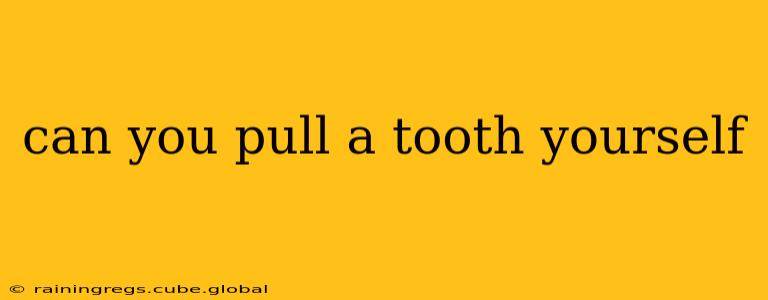Can You Pull a Tooth Yourself? A Risky Proposition
The short answer is: no, you should not attempt to pull your own tooth. While it might seem like a tempting shortcut, especially if you're facing dental anxiety or financial constraints, attempting to extract your own tooth at home can lead to serious and potentially irreversible complications. This article explores the dangers and why seeking professional help is crucial.
What Happens if You Try to Pull Your Own Tooth?
Attempting a DIY tooth extraction carries numerous risks, some of which can have lifelong consequences. These include:
- Incomplete Extraction: You might only partially remove the tooth, leaving fragments behind. These fragments can become infected, causing abscesses and potentially impacting surrounding teeth.
- Broken Tooth: The tooth may break into several pieces during the extraction attempt, making removal even more complex and necessitating more extensive dental work.
- Infection: The mouth is teeming with bacteria. An improper extraction creates an open wound highly susceptible to infection, potentially leading to serious complications like cellulitis or osteomyelitis (bone infection).
- Jaw Damage: Incorrect force application can fracture your jawbone or damage the surrounding tissues, nerves, and blood vessels. This can cause permanent numbness, pain, and functional impairment.
- Excessive Bleeding: You might experience uncontrollable bleeding that's difficult to manage at home.
- Dry Socket: This painful complication can occur after a tooth extraction when the blood clot protecting the socket fails to form or is dislodged.
Why See a Dentist Instead?
Dentists possess the expertise, tools, and sterile environment necessary to safely and effectively remove teeth. They can:
- Properly Diagnose the Problem: Before extraction, they'll determine the tooth's condition and the best extraction method to minimize risks.
- Administer Anesthesia: This numbs the area, ensuring a painless procedure.
- Use Specialized Instruments: Dentists use forceps and elevators designed for precise tooth removal, minimizing trauma to the surrounding tissues.
- Control Bleeding: They can effectively manage bleeding and ensure proper healing.
- Prevent Complications: Their expertise reduces the risks of infection, dry socket, and other complications.
- Provide Aftercare Instructions: They’ll provide detailed instructions to ensure proper healing and address any potential problems promptly.
What are the Alternatives to Pulling a Tooth?
Before resorting to extraction, consider these alternatives:
- Root Canal: If the tooth is infected but still salvageable, a root canal can remove the infection and save the tooth.
- Dental Crown: A crown can protect and restore a damaged tooth.
- Dental Implants: If the tooth needs to be removed, a dental implant can replace it permanently.
Is it possible to pull a loose baby tooth at home?
While it's generally understood that wiggly baby teeth can sometimes be pulled at home, it's still important to ensure the process is as clean as possible. Wash your hands thoroughly, gently wiggle the tooth, and try to avoid causing unnecessary pain or bleeding. If you encounter resistance, it's best to see a dentist.
How much does it cost to have a tooth pulled?
The cost of tooth extraction varies depending on the complexity of the procedure and your location. It's best to contact your dentist directly for a quote. Many dental insurance plans cover at least a portion of the cost.
In conclusion, while the temptation to pull your own tooth might be strong, the risks far outweigh any perceived benefits. Always seek professional dental care for tooth extraction. Your oral health and overall well-being depend on it.
